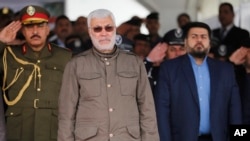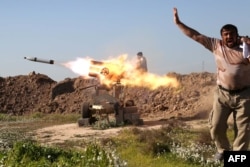Kurdish commanders are warning that once the fight against so-called Islamic State group is over, another conflict could begin – this time against the Iraqi government’s paramilitary units known as the Hashd al-Shaabi.
Kurdish Peshmerga counter-terrorism commander Polad Jangi told VOA the Kurds are unlikely to leave areas they have helped to free from Islamic State.
“If places like Hawija and Mosul get taken, automatically, straight away after that, I think we are going to start having problems with the Iraqi government and the Hashd.
“They are going to want us out straight away. It will be ‘thank you very much, you've helped us, now go back to your places,’” Jangi said.
But he warned, “The Kurds are not going to end up going to take a place, shedding blood for that place, and then being kicked out of that place.”
At stake are the so-called “disputed areas” of Iraq, areas claimed by both Baghdad and the Kurds, such as oil-rich Kirkuk.
“We are not going to give that city back up,” Jangi insisted. “And we know that eventually that's going to be a big problem for us with the Iraqi government.”
Skirmishes between Iraqi Kurds and the Shi’ite militias already have taken place in Tuz Khurmatu, a town with a volatile ethnic mix of Turkmen, Kurds and Arabs that lies on the road from Baghdad to Kirkuk.
According to Human Rights Watch, both Kurdish and Shi’ite armed groups have killed and wounded civilians and destroyed scores of homes and shops in the town.
“Some of those involved in the conflict in Tuz Khurmatu appear to be targeting civilians on the basis of their ethnicity,” Joe Stork, Human Rights Watch's deputy Middle East director, said in a report released this year.
Michael Pregent, an Iraq analyst with the Hudson Institute, said a future conflict between the Kurdish forces and the Hashd will depend on how hard the militia decide to push into land the Kurdish believe is theirs.
“The Hashd is the wild card,” Pregent said.
According to Renad Mansour, a fellow at the Carnegie Middle East Center, the Hashd has become the “single largest ground force” combating Islamic State fighters in Iraq.
The PMF, or Hashd, was formally established in 2014 by Baghdad’s then-Prime Minister Nouri al-Maliki, and is predominantly Shi’ite.
Believed to be backed by Iran, the Hashd is seen as a well trained and determined paramilitary.
They also are seen as brutally sectarian.
“Civilians are paying the price for Iraq’s failure to rein in the out-of-control militias,” said Joe Stork. “Countries that support Iraqi security forces and the Popular Mobilization Forces should insist that Baghdad bring an end to this deadly abuse,” Stork wrote in an HRW report earlier this year.
But the Peshmerga also have been accused of abuses.
In January, Amnesty International’s senior crisis response adviser, Donatella Rovera, said Kurdish forces had destroyed entire villages in areas recaptured from IS in northern Iraq.
“The forced displacement of civilians and the deliberate destruction of homes and property without military justification, may amount to war crimes,” Rovera said.






